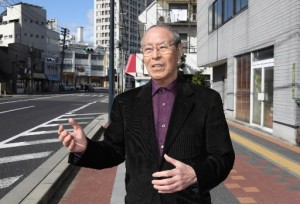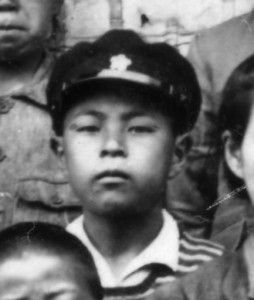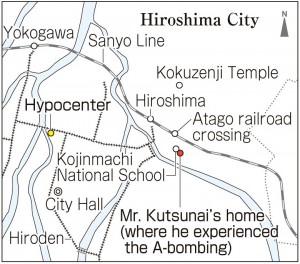Survivors’ Stories: Masaya Kutsunai, 79, Higashi Ward, Hiroshima
Nov. 21, 2016
Enduring hardships and studying diligently to forge a future
by Rie Nii, Staff Writer
Masaya Kutsunai, now 79, suffered severe burns as a result of the heat rays emitted by the atomic bomb, these burns leaving keloid scars all over his chest and stomach and making his body look like a diorama of the world map. When he would go to a public bath, he experienced uncomfortable looks from other bathers. At school, he was teased by other students about losing his hair, a consequence of his exposure to the A-bomb radiation. Nevertheless, his mother, Shizue, worked hard and did all she could to raise him as a single parent. And Mr. Kutsunai studied hard to forge a future for himself.
Mr. Kutsunai was seven years, a second grader at Kojinmachi National School (now Kojinmachi Elementary School in Minami Ward), when Hiroshima was attacked with the atomic bomb. On the morning of August 6, 1945, he was at home, located near his school (about 2.3 kilometers from the hypocenter). It was a very hot day, and because an air-raid alarm had just been lifted, he removed his air-raid hood and shirt which meant he was then wearing only shorts. And it was at that moment he stepped out of the door on the west side of his house, which faced the street, to cool off outside. There was a sudden flash of blinding light and, immediately after, an enormous roar. He was swiftly knocked to the ground.
Their two-story house collapsed and Mr. Kutsunai was trapped under the wreckage. Still, he somehow managed to crawl out by himself. His eldest sister, Kyoko, 18 years older, was in the kitchen at the time and was able to eventually free herself, too. But his mother and another sister, Hanako, eight years older, were buried beneath the wreckage of the house.
Mr. Kutsunai’s body became covered with blisters from his burns. He and his aunt, Akiko Tanaka, who was living nearby, tried to reach a hospital by walking toward Hiroshima Station. But they were soon blocked by a raging fire. They then ventured over the Atago railroad crossing and walked through the East Drill Ground, ending up at Kokuzenji Temple (now located in Yamanecho in Higashi Ward). He still remembers the unbearable, searing pain he experienced, along with the intense heat of the mid-summer sun. When they finally arrived at the temple, they found that it was full of many people, wounded and burned, in the corridors and under the floor of the main hall. He and his aunt found a small empty spot by the temple gate to sit down.
On the evening of August 6, his wounds were treated by military medical staff. They excised his blisters with a surgical knife, applied medicine, and wrapped his body in a bandage. Eventually, he would be bandaged from head to toe.
On August 8, he was carried to Funakoshi National School (now Funakoshi Elementary School in Aki Ward) on a large two-wheeled cart by neighbors. It was at Funakoshi National School that he was reunited with Kyoko as well as with his mother and Hanako, who had been rescued from the rubble of their home by neighbors and passersby.
Pus was seeping from the burns on his shoulders, chest, and stomach, and his wounds became watery. He also developed a high fever and felt chilly and shivery. Pus was also running from his head and he lost all his hair. His mother and sisters didn’t think he would survive much longer.
However, Mr. Kutsunai was able to gradually recover, and in the middle of September, took shelter with his uncle, Isamu Maruyama, who was living nearby and whose house had escaped the destruction. But when Mr. Kutsunai returned to school, he was teased by classmates about losing his hair. When he told his mother, she got a cap for him. He wore this cap when the class photo was taken.
Because the powerful A-bomb blast had leveled the school building, a temporary classroom was raised on the grounds. Because the windows of this structure were covered with thick paper, Mr. Kutsunai said that the inside of the classroom was so dim that it was hard to read the blackboard from the back of the room. For the next three years, classes were taught outside on the school grounds, which was not a conducive environment for learning.
His father, Tatsuzo, had previously died of illness soon after Mr. Kutsunai was born, so his mother asked him to help make ends meet by finding a job after he graduated from junior high school. However, because he was eager to continue his studies, he entered Koryo High School on a scholarship. After graduating from high school, he worked during the day and studied at Hiroshima University in the evenings.
As to why the atomic bomb was dropped on Hiroshima, it is generally said that this is because, in those days, Hiroshima was a military city with many military facilities and therefore became a target of the United States. Mr. Kutsunai, however, rebutted this idea by saying, “That isn’t true. The fact is, the victims of the atomic bomb were mostly ordinary citizens.”
When U.S. President Barack Obama spoke in the Hiroshima Peace Memorial Park in May of this year, he said that many men, women, and children died in the bombing. Mr. Kutsunai suggested that repeated visits by A-bomb survivors to the United States, to talk about their experiences of the bombing, had probably helped elicit this remark from the president. As long as nuclear weapons exist in this world, he said, there is always the possibility of a nuclear accident. Mr. Kutsunai hopes dearly that all nuclear arms, as well as war itself, will be eliminated from the earth.
***
Teenagers’ impressions
Impressed by Mr. Kutsunai’s positive spirit
Mr. Kutsunai endured a lot of hardship in the days after the atomic bombing, when he was separated from his family and when he was teased by classmates about losing his hair. I was really struck by his strong spirit. I don’t have courage to keep moving forward when I face tough times. I learned from him that it’s very important to have firm thoughts and beliefs in order to overcome life’s difficulties and hardships. (Ryoma Iwata, 13)
Suffered so terribly from the destruction of war
When he went to a public bath (because his house had no bathtub), he was the target of dirty looks because of the keloid scars that developed from the scars left by his bad burns. And this treatment deterred him from bathing in public. It wasn’t his choice to be exposed to the atomic bomb, but he had to endure such a terrible time because of the damage caused by the atomic bomb. I felt so sorry for him. I want everyone to know much more about the horrible consequences and destruction caused by war. (Yui Morimoto, 12)
Feel empathy for his pride
Mr. Kutsunai never visited the Atomic Bomb Casualty Commission (ABCC, now the Radiation Effects Research Foundation) to take part in the research involving A-bomb survivors. He said his pride as an A-bomb survivor wouldn’t allow it. When his mother died, a request was made to autopsy her body, but he refused to give his permission. I wouldn’t be able to endure that, either, not receiving medical treatment but being treated like a guinea pig instead. My impression of the ABCC has changed. (Miku Yamashita, 17)
by Rie Nii, Staff Writer
Masaya Kutsunai, now 79, suffered severe burns as a result of the heat rays emitted by the atomic bomb, these burns leaving keloid scars all over his chest and stomach and making his body look like a diorama of the world map. When he would go to a public bath, he experienced uncomfortable looks from other bathers. At school, he was teased by other students about losing his hair, a consequence of his exposure to the A-bomb radiation. Nevertheless, his mother, Shizue, worked hard and did all she could to raise him as a single parent. And Mr. Kutsunai studied hard to forge a future for himself.
Mr. Kutsunai was seven years, a second grader at Kojinmachi National School (now Kojinmachi Elementary School in Minami Ward), when Hiroshima was attacked with the atomic bomb. On the morning of August 6, 1945, he was at home, located near his school (about 2.3 kilometers from the hypocenter). It was a very hot day, and because an air-raid alarm had just been lifted, he removed his air-raid hood and shirt which meant he was then wearing only shorts. And it was at that moment he stepped out of the door on the west side of his house, which faced the street, to cool off outside. There was a sudden flash of blinding light and, immediately after, an enormous roar. He was swiftly knocked to the ground.
Their two-story house collapsed and Mr. Kutsunai was trapped under the wreckage. Still, he somehow managed to crawl out by himself. His eldest sister, Kyoko, 18 years older, was in the kitchen at the time and was able to eventually free herself, too. But his mother and another sister, Hanako, eight years older, were buried beneath the wreckage of the house.
Mr. Kutsunai’s body became covered with blisters from his burns. He and his aunt, Akiko Tanaka, who was living nearby, tried to reach a hospital by walking toward Hiroshima Station. But they were soon blocked by a raging fire. They then ventured over the Atago railroad crossing and walked through the East Drill Ground, ending up at Kokuzenji Temple (now located in Yamanecho in Higashi Ward). He still remembers the unbearable, searing pain he experienced, along with the intense heat of the mid-summer sun. When they finally arrived at the temple, they found that it was full of many people, wounded and burned, in the corridors and under the floor of the main hall. He and his aunt found a small empty spot by the temple gate to sit down.
On the evening of August 6, his wounds were treated by military medical staff. They excised his blisters with a surgical knife, applied medicine, and wrapped his body in a bandage. Eventually, he would be bandaged from head to toe.
On August 8, he was carried to Funakoshi National School (now Funakoshi Elementary School in Aki Ward) on a large two-wheeled cart by neighbors. It was at Funakoshi National School that he was reunited with Kyoko as well as with his mother and Hanako, who had been rescued from the rubble of their home by neighbors and passersby.
Pus was seeping from the burns on his shoulders, chest, and stomach, and his wounds became watery. He also developed a high fever and felt chilly and shivery. Pus was also running from his head and he lost all his hair. His mother and sisters didn’t think he would survive much longer.
However, Mr. Kutsunai was able to gradually recover, and in the middle of September, took shelter with his uncle, Isamu Maruyama, who was living nearby and whose house had escaped the destruction. But when Mr. Kutsunai returned to school, he was teased by classmates about losing his hair. When he told his mother, she got a cap for him. He wore this cap when the class photo was taken.
Because the powerful A-bomb blast had leveled the school building, a temporary classroom was raised on the grounds. Because the windows of this structure were covered with thick paper, Mr. Kutsunai said that the inside of the classroom was so dim that it was hard to read the blackboard from the back of the room. For the next three years, classes were taught outside on the school grounds, which was not a conducive environment for learning.
His father, Tatsuzo, had previously died of illness soon after Mr. Kutsunai was born, so his mother asked him to help make ends meet by finding a job after he graduated from junior high school. However, because he was eager to continue his studies, he entered Koryo High School on a scholarship. After graduating from high school, he worked during the day and studied at Hiroshima University in the evenings.
As to why the atomic bomb was dropped on Hiroshima, it is generally said that this is because, in those days, Hiroshima was a military city with many military facilities and therefore became a target of the United States. Mr. Kutsunai, however, rebutted this idea by saying, “That isn’t true. The fact is, the victims of the atomic bomb were mostly ordinary citizens.”
When U.S. President Barack Obama spoke in the Hiroshima Peace Memorial Park in May of this year, he said that many men, women, and children died in the bombing. Mr. Kutsunai suggested that repeated visits by A-bomb survivors to the United States, to talk about their experiences of the bombing, had probably helped elicit this remark from the president. As long as nuclear weapons exist in this world, he said, there is always the possibility of a nuclear accident. Mr. Kutsunai hopes dearly that all nuclear arms, as well as war itself, will be eliminated from the earth.
***
Teenagers’ impressions
Impressed by Mr. Kutsunai’s positive spirit
Mr. Kutsunai endured a lot of hardship in the days after the atomic bombing, when he was separated from his family and when he was teased by classmates about losing his hair. I was really struck by his strong spirit. I don’t have courage to keep moving forward when I face tough times. I learned from him that it’s very important to have firm thoughts and beliefs in order to overcome life’s difficulties and hardships. (Ryoma Iwata, 13)
Suffered so terribly from the destruction of war
When he went to a public bath (because his house had no bathtub), he was the target of dirty looks because of the keloid scars that developed from the scars left by his bad burns. And this treatment deterred him from bathing in public. It wasn’t his choice to be exposed to the atomic bomb, but he had to endure such a terrible time because of the damage caused by the atomic bomb. I felt so sorry for him. I want everyone to know much more about the horrible consequences and destruction caused by war. (Yui Morimoto, 12)
Feel empathy for his pride
Mr. Kutsunai never visited the Atomic Bomb Casualty Commission (ABCC, now the Radiation Effects Research Foundation) to take part in the research involving A-bomb survivors. He said his pride as an A-bomb survivor wouldn’t allow it. When his mother died, a request was made to autopsy her body, but he refused to give his permission. I wouldn’t be able to endure that, either, not receiving medical treatment but being treated like a guinea pig instead. My impression of the ABCC has changed. (Miku Yamashita, 17)










